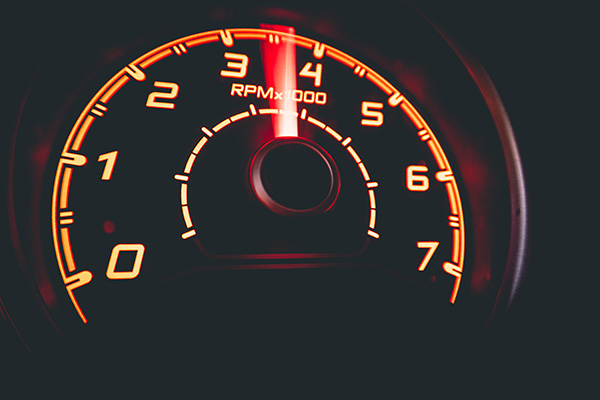
Do you notice your car’s RPMs fluctuating instead of staying steady? It’s a common issue, but what’s causing your car's RPM to be unstable at idle? The culprit could be anything from airflow problems to fuel delivery issues or electrical faults. Let’s look into some of the most common reasons why this happens and what you can do to fix it.
What Causes Unstable RPM at Idle?
There are several reasons why your car's RPMs might bounce around when it should be idling steadily. Let’s explore the most common causes that could be affecting your vehicle.
Vacuum Leaks
Another common cause of fluctuating RPMs at idle is a vacuum leak. Your engine relies on a delicate balance of air and fuel to run efficiently, and if there’s a leak in one of the vacuum hoses, it disrupts this balance. The engine may receive too much air, causing the RPM to rise and fall erratically. You can check for a vacuum leak by listening for hissing sounds under the hood or having a professional inspect the system.
Mass Airflow Sensor (MAF) Issues
The Mass Airflow Sensor (MAF) is critical in measuring the air entering your engine and adjusting the air-fuel mixture accordingly. A faulty or dirty MAF sensor can send incorrect data to your car’s computer, causing improper fuel delivery. This imbalance can lead to RPM fluctuations when idling. Cleaning or replacing the MAF sensor can correct the problem.
Dirty or Faulty Idle Air Control Valve (IACV)
The Idle Air Control Valve (IACV) regulates your engine’s idle speed by controlling the amount of air that bypasses the throttle plate. If this valve becomes clogged with dirt or debris, it can cause irregular airflow, leading to an unstable idle. You may notice your RPMs dipping too low or surging unexpectedly. Cleaning or replacing a dirty IACV can often resolve this issue and restore your car’s idle performance.
Fuel System Problems and Unstable RPM
If the problem isn’t related to airflow, it might be an issue with your car’s fuel system. Let’s look at a few fuel-related causes that could be messing with your RPMs.
Dirty Fuel Injectors
Your fuel injectors deliver the exact amount of fuel your engine needs to run efficiently. Over time, dirt and debris can clog the injectors, leading to poor fuel delivery, which can result in unstable RPM at idle. Cleaning the fuel injectors can restore proper fuel flow and eliminate those frustrating RPM fluctuations.
Failing Fuel Pump or Fuel Filter
A weak or failing fuel pump can also cause your car to idle erratically. If the fuel pump isn’t supplying a consistent amount of fuel, or if your fuel filter is clogged, the engine may struggle to maintain a stable idle. Replacing a failing pump or filter can often fix this issue and ensure your engine gets the fuel it needs to run smoothly.
Electrical Problems and RPM Fluctuations
It’s not just air and fuel that can cause your RPM to be unstable. Electrical components play a crucial role in maintaining engine performance as well.
Bad Spark Plugs or Ignition Coils
Worn-out spark plugs or faulty ignition coils can cause misfires, leading to irregular RPMs when idle. If your engine isn’t firing on all cylinders, it struggles to maintain a consistent idle speed. Replacing old spark plugs or faulty ignition coils is a quick and easy fix that can improve your car’s idle and overall performance.
Sensor Malfunctions
Modern cars rely on various sensors to regulate engine performance, including the Throttle Position Sensor (TPS) and Oxygen (O2) sensors. If one of these sensors malfunctions or sends incorrect data to your car’s computer, it can cause the RPM to fluctuate. Replacing a faulty sensor is usually a straightforward solution, but diagnosing the issue may require professional help.
What Can You Do About Unstable RPM?
If your car’s RPM is not stable at idle, it’s important to address the issue before it worsens. Fluctuating RPMs could be a sign of a larger problem, and fixing it early can save you time and money in the long run. Here are a few things you can do:
- Check for Vacuum Leaks: Inspect your vacuum hoses for cracks or leaks, or have a professional check them for you.
- Clean or Replace the IACV: A dirty Idle Air Control Valve is a common cause of fluctuating RPMs. Cleaning or replacing it can help stabilize your engine’s idle.
- Get Your Sensors Checked: If you suspect a sensor malfunction, have your car diagnosed by a professional to identify and replace the faulty component.
- Fuel System Maintenance: Ensure your fuel injectors, pump, and filter are in good condition to prevent any fuel delivery issues.
Tired of dealing with RPM issues? Tom’s Auto Center is here to help. Our experienced technicians will quickly diagnose the problem and get your car back on track. Call or visit us today to schedule your inspection!